Welfare checks for pandemic payment fraud targeted Eastern Europe flights

Dublin Airport during the Covid 19 Pandemic. Picture: Stephen Collins
The Department of Social Protection has left itself open to accusations of profiling nationalities after it emerged that the vast majority of its airport checks for people abusing welfare benefits like the Pandemic Unemployment Payment during the Covid-19 pandemic were aimed at flights to eastern Europe.
The Department authorised officials to hold checkpoints ahead of 30 separate flights from Dublin Airport between 1 April and 13 June.
Twenty-one of those flights alone, or 70%, were carried out ahead of flights to Romania and Moldova.
No checkpoints whatsoever were set up on flights to either the US or the United Kingdom, both majority English-speaking countries.
The information was released to law student Roman Shortall under freedom of information. Mr Shortall himself was detained at one such checkpoint while flying to Romania with his wife and children in early June, as was everyone boarding the same plane.
Mr Shortall’s wife’s child benefit payments were subsequently stopped before being reinstated.
The Department said the 30 checkpoints had been instigated under the authorisation of officials of assistant secretary and principal level, but said that records giving their identity could not be released as they did not exist.
Access to communications regarding the management of those checkpoints was denied as to release them would be prejudicial to the prevention and detection of fraud offences, the enforcement of law, and the fairness of criminal proceedings, the Department said.
Gavin Barrett, professor of EU law at the Sutherland Law School, said that “in terms of EU rules if you are enforcing welfare law you are expected to recognise people’s fundamental rights when doing so”.
“If you are only checking one kind of flight then issues of profiling and discriminatory treatment of certain categories of people are certainly a source of concern,” Professor Barrett said.
Three flights to Amsterdam and one to Qatar were the only examples of the 30 destinations not located in the east of Europe. Two flights to Latvia, two to Germany, and one to Turkey make up the remainder.
The Department declined to answer questions regarding the choice of flight destinations for checkpoints, and what reasonable grounds were being used to audit same during the period in question. It also declined to shed light as to who had authorised the checkpoints, or as to what sanctions had emerged from those checkpoints.
“The Department undertook control measures in Dublin Airport during the period in question,” a spokesperson said.
“These measures relate solely to normal control and compliance work that all social welfare schemes are subject to on an ongoing basis.
"This is to combat social welfare fraud and ensure that payments are not made to persons living outside the country. The Department does not comment on individual control operations.”
Olga Cronin, policy officer with the Irish Council for Civil Liberties, said that the fact so many of the flights in question were to eastern Europe is “alarming”.
She said that the “reasonable grounds”, as cited by Ireland’s 2005 Social Welfare Consolidation Act, for performing the checkpoints had never been resolved. “The legal basis for this approach is unclear,” Ms Cronin said.
“It’s necessary for the Department to explain how this approach was decided upon, who decided it, when it began and the basis for same.” The Department had come in for a deal of criticism regarding the PUP after it emerged it had changed its regulations regarding the payment of €350 per week to only encompass recipients who are “genuinely looking for work” at the start of July.
Similarly, the Minister for Social Protection Heather Humphreys had declared that recipients of the PUP could not leave the country despite this being in apparent contradiction of existing legislation. The Minister subsequently reversed course on this declaration.





